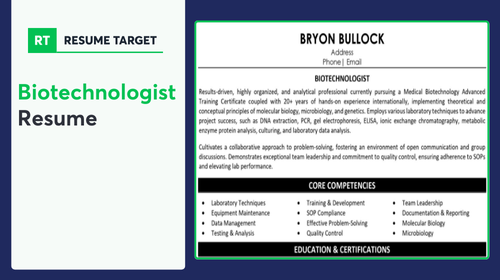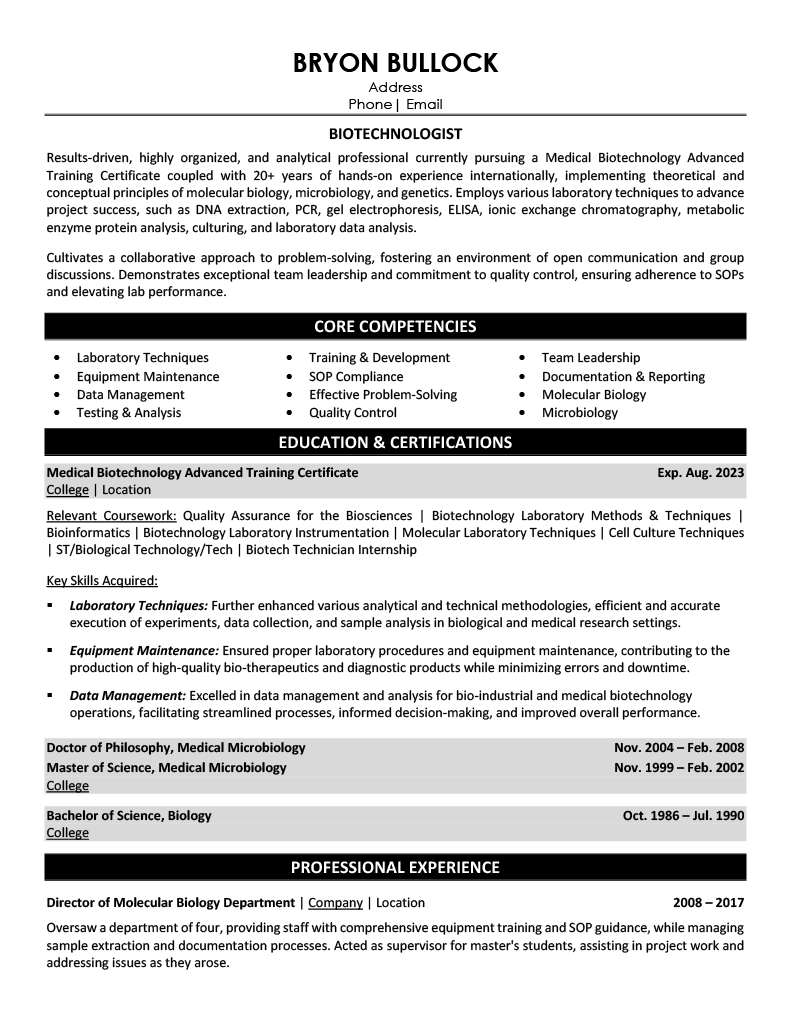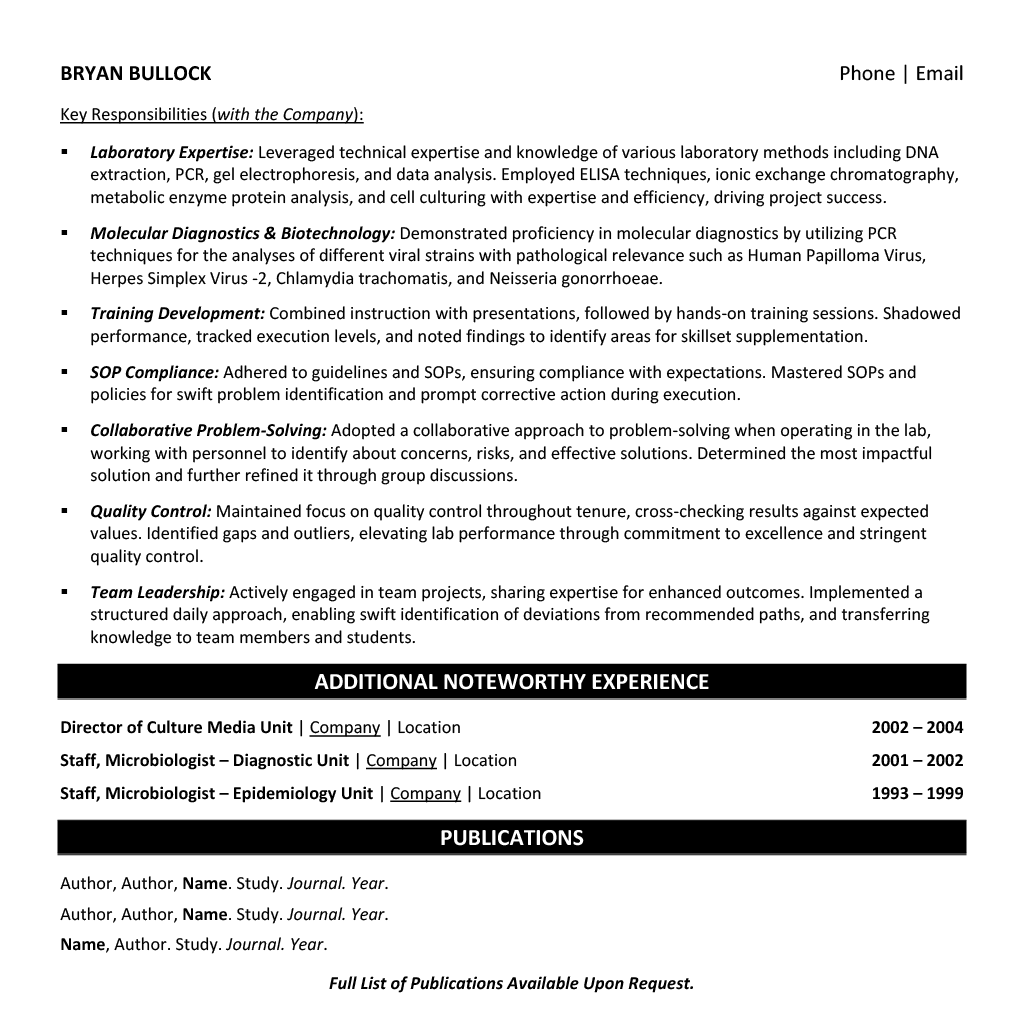

In a field where complex lab work meets groundbreaking innovation, most biotechnologists struggle to translate their technical expertise into compelling resume content. Your breakthrough research and analytical skills deserve more than a list of lab techniques.
Are you finding it challenging to showcase both your scientific achievements and your business impact? A well-crafted biotech resume needs to bridge the gap between complex laboratory work and real-world applications that employers value.
Resume Target specializes in helping biotechnology professionals communicate their value to both scientific and non-technical hiring managers. This guide will show you exactly how to transform your research experience and technical skills into a powerful resume that lands interviews.


At the frontier of scientific innovation, biotechnologists are modern-day alchemists who harness the power of living organisms to solve real-world problems, from developing protein-based drugs to creating hardier crops that can feed our growing population.
As a biotechnologist, you'll spend your days in sophisticated laboratories manipulating DNA, optimizing protein expression, and using cutting-edge techniques to monitor product quality - essentially acting as an architect of biological solutions that bridge the gap between scientific discovery and practical applications.
Whether you're fascinated by pharmaceutical breakthroughs, agricultural innovations, or cosmetic developments, the biotechnology field offers diverse career paths that can evolve with your interests and expertise, making it an exciting time to join this rapidly growing industry.
Let's talk about what's exciting in the biotechnology field - your earning potential is truly impressive! From research labs to pharmaceutical companies, biotechnology professionals are seeing strong compensation packages that reflect their expertise and the innovative nature of their work. And guess what? The field offers multiple pathways to advance your career while increasing your earning power.
Figures from: Northeastern University Graduate Programs
Start your biotechnology career with a college degree and entry-level lab work. With experience and continued education, you can advance to senior positions leading groundbreaking research projects.
To accelerate your career growth, you'll need to master both technical expertise and leadership capabilities.
- Molecular Biology and Cell Culture Techniques - Analytical Chemistry and Protein Purification - Laboratory Equipment Operation and Maintenance - Project Management and Team LeadershipLaunch your biotechnology career by combining hands-on lab experience with specialized education, starting with entry-level positions that build foundational skills in molecular biology and laboratory techniques.
To advance in biotechnology, you'll need to master key technical abilities like molecular biology and cell culture techniques, while developing essential soft skills that will support your career growth.
Requirements from Healthcare Degree
From biotech hubs on both coasts to emerging research centers, biotechnology careers are thriving in labs and facilities nationwide.
Figures from Medium
Struggling to showcase your lab expertise, research achievements, and technical skills in a way that catches a hiring manager's attention? This comprehensive, section-by-section guide will help you create a biotechnologist resume that effectively highlights your scientific contributions and research capabilities.
As a biotechnologist, you excel at analyzing complex biological systems and conducting groundbreaking research, but condensing your expertise into a compelling resume summary can feel more challenging than perfecting a cell culture protocol.
While you're comfortable with advanced laboratory techniques and breakthrough innovations, translating these specialized skills into language that resonates with hiring managers requires a strategic approach that highlights both your technical prowess and real-world impact.
How would you describe your unique blend of biotechnology specializations (such as molecular biology, genetic engineering, or bioprocessing) and how they align with current industry demands?
Reason: Opening with your technical foundation helps immediately position you within the biotechnology field while demonstrating market awareness. This creates immediate relevance for hiring managers seeking specific biotechnology expertise.
What overarching impact have your biotechnology contributions made to research advancement, product development, or process optimization across your career?
Reason: This helps frame your career narrative around broad value creation rather than specific metrics, allowing you to showcase your strategic influence in biotechnology innovation.
How do you combine your technical biotechnology expertise with soft skills like cross-functional collaboration and regulatory compliance to drive successful outcomes?
Reason: Modern biotechnology roles require both technical prowess and business acumen. Highlighting this combination demonstrates your well-rounded capabilities as a biotechnology professional.
As a biotechnologist, you'll need to showcase both your advanced laboratory expertise and your ability to handle day-to-day research protocols, making it crucial to strike the right balance in your skills section.
Your resume should highlight specialized skills like genetic engineering techniques and bioinformatics tools, while also demonstrating fundamental abilities like aseptic technique, cell culture maintenance, and documentation practices.
Showcase your laboratory expertise and research innovations by organizing your biotechnology experience into three powerful sections: a concise role overview, quantifiable research achievements, and core technical responsibilities.
Many biotechnologists struggle to translate complex laboratory innovations and research breakthroughs into clear, compelling achievements that resonate with hiring managers. Transform your technical expertise into powerful success stories by connecting your research outcomes to measurable impacts on product development, cost savings, and scientific advancement.
A well-crafted responsibilities section demonstrates how Biotechnologists drive innovation in biological research and product development. Your duties should showcase both technical expertise and practical applications while explaining complex work in terms that hiring managers can understand and connect to organizational goals.
Your educational background and professional certifications are crucial assets in the biotechnology field. Start with your highest degree in biological sciences, biochemistry, or related fields, then list any specialized certifications in areas like GMP compliance, bioprocessing, or laboratory techniques that demonstrate your expertise.
Now that you've created a strong foundation using Resume Target's comprehensive resume writing guidelines, you're ready to transform your resume into a powerful tool for landing biotechnology positions.
While many candidates focus solely on customizing their cover letters, successful biotechnologists know that personalizing their resume for each specific role is equally crucial in today's competitive scientific job market.
By strategically incorporating relevant keywords and highlighting specific biotechnology skills and experiences that match each job description, your resume will not only sail through ATS screening systems but will also immediately demonstrate to hiring managers that you're the ideal candidate they've been searching for.
Ready to stand out in the biotechnology field? Let's transform your resume from good to exceptional by tailoring it to speak directly to your dream employer's needs!
Don't let a lack of work experience hold you back from launching your biotechnology career! Your journey into biotech can start strong by showcasing your academic achievements, laboratory skills, and research projects rather than unrelated work history.
Focus on highlighting your technical expertise, research experience, and analytical capabilities to create a compelling resume.
For detailed guidance on structuring your entry-level biotech resume, check out the Student Resume Writing Guide to ensure you're presenting your qualifications in the best possible light.
Your resume summary is your chance to showcase your cutting-edge biotechnology education, research projects, and laboratory expertise that make you an ideal candidate for this dynamic field.
Focus on highlighting your hands-on lab techniques, research contributions, and passion for advancing biological solutions to showcase your readiness for a biotechnology career.
"Detail-oriented and research-driven Biotechnologist with extensive academic training and 2+ years of laboratory research experience. Proficient in cell culture techniques, PCR analysis, and protein purification methods, with demonstrated success in completing three major research projects. Contributed to a published paper on genetic modification techniques while maintaining 99.9% accuracy in lab protocols. Seeking to leverage strong analytical and technical skills to advance biotechnology innovations in a growth-oriented organization."
Now's your chance to showcase the specialized scientific knowledge and laboratory expertise you've gained through your academic journey in biotechnology!
Transform your coursework and research projects into compelling content by highlighting relevant classes like "Molecular Biology Techniques"or "Bioprocess Engineering,"along with any significant laboratory research that demonstrates your hands-on expertise with key biotechnology procedures and equipment.
The coursework common to a degree/certification for Biotechnologists includes various fundamental courses in biology, chemistry, physics, and mathematics, as well as specialized subjects like genetics and biochemistry.Relevant Coursework: Molecular Biology | Biochemistry | Genetic Engineering | Cell Culture Techniques | Bioprocess Engineering | Microbial Biotechnology
Key Projects:
Recombinant Protein Expression Optimization: Developed and implemented an enhanced protocol for protein expression in E. coli, resulting in 40% increased yield of target protein while maintaining product quality.
Bioreactor Process Development: Collaborated with a team of four researchers to design and optimize a fed-batch fermentation process for production of therapeutic antibodies.
Leverage your academic training, laboratory experience, and technical expertise by showcasing the valuable skills you've developed through coursework, research projects, and internships to create a compelling biotechnology skill set that catches employers' attention.
As an entry-level biotechnologist, your combination of laboratory skills and analytical capabilities positions you well for the growing opportunities in biotechnology research, pharmaceutical development, and innovative biological solutions.
When you're deep in the lab working with groundbreaking research and complex molecular processes, it's tough to step back and explain your impact in terms that hiring managers can quickly grasp - especially when every experiment and breakthrough feels too nuanced for a bullet point.
At Resume Target, we specialize in translating intricate biotech achievements into powerful career stories that resonate with both technical and non-technical readers.
Our expert writers have helped countless biotechnologists showcase their contributions to drug development, genetic engineering, and cellular research in ways that capture attention and drive interviews.
With biotech hiring heating up and companies racing to secure top talent for emerging technologies, now is the time to transform your technical expertise into a compelling career narrative - let's connect today to craft your standout resume.
Impress any hiring manager with our Biotechnology resume writing service. We work with all career levels and types of Biotechnology professionals.
Learn More → Biotechnology Resume Writing Services